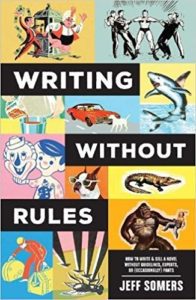
As the title implies, this writing guide breaks down misconceptions we all have with the craft of writing to help free creativity. Split into two parts, Somers’s approach to the craft takes a realistic and simplistic approach to writing that’s quite different from the glut of guides on the market. Part I: Writing a Novel (How to do it without breaking a sweat or putting on pants) covers the things you need to write a story, which surprisingly, isn’t a lot. You don’t need fancy software or a high-end computer or a jeweled fountain pen and expensive paper to write; pen, or pencil, and whatever paper is handy. Just write. Somers covers ideas, dialogue, setting, characterization, and plotting, using time worn “rules” he’s (and most every other writer) heard over the years and turns them on their heads with new concepts, providing fresh ways to overcome familiar issues. He writes about what kind of details actually work in a setting, and why you really don’t need to get into all the details about your characters. One particular segment deals with the pantsing vs. plotting discussion and offers up a new term: plantsing. Surely you can guess what it means, but sometimes you need that little nudge to know that you can use whatever works for you until it doesn’t work, then know you can switch gears and try another method. He even suggests reverse engineering your story to make it sing, which is something all writer’s do to some degree at the editing stages anyway. Here, you have permission, so get to it.

Will everything covered here help you get published? Well, no one thing ever will, except for your own hard work and dedication. It does help to know a little of the craft and business, but you don’t need to make a career out of it, unless you do actually want to make a career out of it. For the most part, Writing Without Rules is about breaking free of any kind of restriction that hinders your ability to put words on the page. Why worry about all the “rules” when you need to be writing? Jeff Somers know a little bit about writing, and the business of writing, and with his book, he aims to make sure those things never stifle your creativity. Whether you’re just starting out, or a seasoned professional, anyone could stand a little refresher about the most important part of being a writer, the actual writing.
BOB PASTORELLA
